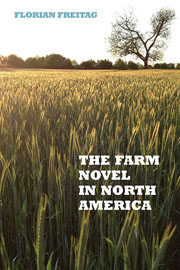 The Farm Novel in North America
The Farm Novel in North America Published online by Cambridge University Press: 05 December 2013
When the Great Depression hit North America in the 1930s, there were many who considered the farm a refuge from urban misery and poverty, a place where living on and off their own land, people would enjoy a certain measure of self-sufficiency and dignity in spite of the economic crisis. North American farm novels from the Depression era responded to this agrarianist idealization of the rural space with a “revolt from the farm,” by depicting the farm as a place that was troubled by crises of its own. These included “natural” crises, such as droughts, floods, fires, crop diseases, soil erosion, and insect epidemics, but also “man-made” economic and social crises, as, for instance, market price fluctuations for crops, mortgage foreclosures, or even religious persecution. Far from being a safe alternative for the victims of the Depression and especially the urban poor and unemployed, farm life is depicted in Depression-era farm novels as an economically precarious existence, dominated by a seemingly never-ending fight for the land, with the farmer constantly threatened from all sides with the loss of ownership of his soil.
In addition to addressing the question of what constitutes rightful ownership of the land—legal titles, the “moral” right to ownership of those who work the land, or, especially in French Canadian farm novels, the “moral” right to ownership of those who inherited the land from their ancestors—farm novels from this time also debate how the farmer's enemies may be fought.
To save this book to your Kindle, first ensure [email protected] is added to your Approved Personal Document E-mail List under your Personal Document Settings on the Manage Your Content and Devices page of your Amazon account. Then enter the ‘name’ part of your Kindle email address below. Find out more about saving to your Kindle.
Note you can select to save to either the @free.kindle.com or @kindle.com variations. ‘@free.kindle.com’ emails are free but can only be saved to your device when it is connected to wi-fi. ‘@kindle.com’ emails can be delivered even when you are not connected to wi-fi, but note that service fees apply.
Find out more about the Kindle Personal Document Service.
To save content items to your account, please confirm that you agree to abide by our usage policies. If this is the first time you use this feature, you will be asked to authorise Cambridge Core to connect with your account. Find out more about saving content to Dropbox.
To save content items to your account, please confirm that you agree to abide by our usage policies. If this is the first time you use this feature, you will be asked to authorise Cambridge Core to connect with your account. Find out more about saving content to Google Drive.